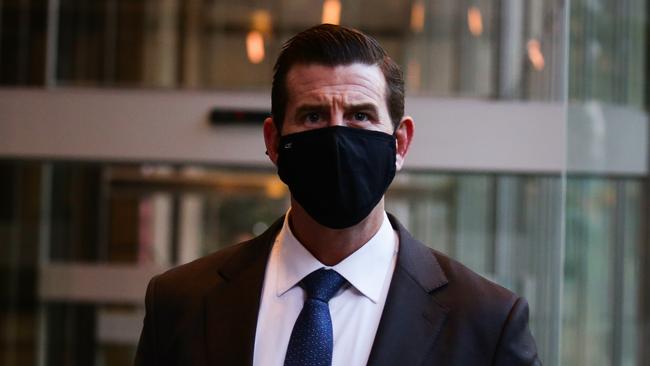Ben Roberts-Smith: War crimes documents to be examined in VC hero case
Investigators who probed alleged war crimes in Afghanistan must hand over key documents in Ben Roberts-Smith’s defamation trial.

Investigators who probed alleged war crimes in Afghanistan must hand over key documents related to three Australian soldiers expected to appear as witnesses for Ben Roberts-Smith in his defamation trial against Nine newspapers after the Federal Court upheld a subpoena issued by the media outlets in June.
Mr Roberts-Smith has previously been accused of communicating with persons 5, 11, and 35, whom he admitted are all close friends of his, about the evidence they gave to the Inspector-General of the Australian Defence Force during a 2018 investigation into the conduct of Australian soldiers in Afghanistan.
Mr Roberts-Smith, 42, is suing The Sydney Morning Herald, The Age and The Canberra Times, now under separate ownership, over reports published in 2018 that alleged he committed murder during deployments to Afghanistan. He denies the allegations and says the reports portray him as a war criminal.
He is also suing over reports alleging he assaulted a woman – a key witness in the defamation proceedings – at a Canberra hotel in March 2018.
As part of its truth defence, the newspapers allege that Mr Roberts-Smith committed or was complicit in six unlawful killings in Afghanistan, including their “centrepiece” allegation — the murder of unarmed Afghan Ali Jan.
Nicholas Owens, SC, for Nine, has previously told the court that person 5 ordered an Afghan person to be shot in Mr Roberts-Smith’s presence, alleged person 11 was involved in a “joint criminal enterprise” with Mr Roberts-Smith over Jan’s death, and alleged person 35 was “intimately involved” in other crimes.
Mr Roberts-Smith said he was crossing a creek bed when person 11 began shooting at a man, believed to be a Taliban spotter, in a nearby cornfield. Last month, Bruce McClintock, SC, for Mr Roberts-Smith, said the spotter was killed within the rules of engagement and was carrying a radio at the time of his death.
“If someone called Ali Jan did die, then it was because he was a spotter, sitting in a cornfield killed legitimately by (Mr Roberts-Smith) or Person 11,” he said.
In a judgment on Wednesday, Justice Anthony Besanko dismissed an application by barrister Tim Saunders, acting for persons 5, 11, and 35, opposing the release of defence documents to Nine that would outline whether they “communicated” evidence given to a war crimes inquiry with “any other person.”
The soldiers opposed the release of documents under public interest immunity rules, arguing it was sought by the media outlets in a bid to “impugn the credit of each of them and to provide evidence of collusion.”
The newspapers claimed new information had emerged suggesting Mr Roberts-Smith may have communicated with persons 5, 11 and 35 in regards to evidence given to the Inspector-General of the Australian Defence Force and in his legal action against the media company and three journalists.
Last month, Mr Owens claimed person 5 had shared details about his interview with the IGADF with Mr Roberts-Smith.
On Wednesday, Justice Besanko said it was “highly significant” that the Commonwealth and the IGADF “no longer” claimed public interest immunity over the material subpoenaed by Nine. He found the soldiers had “adduced no evidence whatsoever” suggesting that “exceptional circumstances” should prevent the disclosure of the material. “I would not set aside the subpoena on this ground,” Justice Besanko said.
In a brief online hearing on Wednesday, the court heard the defamation trial could be moved to Perth or Adelaide, as concerns mount over the unfolding Covid-19 outbreak in NSW and the potential implications for continuing the case inside a cramped Sydney courtroom during a citywide lockdown.
Justice Besanko had scheduled a hearing for July 19, aiming to resuming the 10-week trial on July 26. However, NSW Premier Gladys Berejiklian confirmed on Wednesday that a lockdown in Greater Sydney would be extended until at least July 30, potentially up-ending the course of the defamation trial.
Mr Owens had asked the court to resume the trial for one week on July 26 to hear evidence from four Afghan witnesses who will be questioned via videolink from Kabul.
Three of the witnesses allege they saw or heard Mr Roberts-Smith kick Ali Jan off a cliff in Afghanistan while handcuffed in Darwan in 2012. He was then allegedly shot dead by Australian soldiers. A fourth Afghan witness is also expected to provide evidence about Jan being held in custody by Australian soldiers.
On Wednesday, Mr Owens conceded that it was unlikely the trial could resume on July 26 “unless there is a dramatic change” to Sydney’s Covid-19 situation. Given the unfolding outbreak in Sydney, Mr McClintock said the court may be required to move the trial to Perth or Adelaide in order to “keep this case going.”




